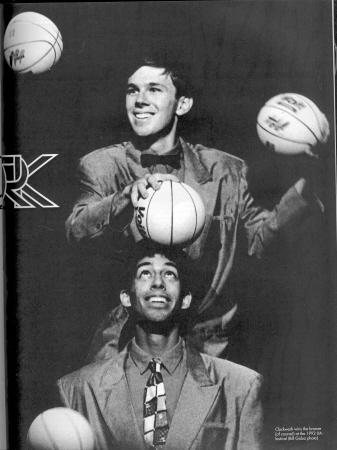
Clockwork wins the bronze (of course!) of the 1992 IJA festival. (Bill Giduz photo) |
Page 10 Summer 1996
|
Making Time with CLOCKWORK A look Inside a Bronze-Plated, Precision Entertainment Machine by
Kathy Kalvan
Most
jugglers don't have plastic flowerpots
Clockwork
- as Jack Kalvan and Rick Rubenstein are known capped off 1995,
their best year yet, with a 10-week engagement at the Wintergarten
Variete theater in Berlin, Germany. It was quite a departure from
their usual jobs, but a welcome and memorable departure.
I
was fortunate to be able to take a break from work and join them,
which was especially nice since Jack and I had just gotten married.
However, I'm not here to tell you about "My Life as a Clockwife,"
I'm here to give you a glimpse into where the team is today... and
where they came from.
Europe
'95 The
Wintergarten is a renowned dinner theatre, and according to its
The
show featured: American-born clown Peter Shub, Ezio Bedin,
For
European audiences, Clockwork performed routines with visual comedy
and music - plus one comedy bit using simple English. Jack and Rick
also had other scenes, playing the part of tourists. They did learn a
good deal of German backstage, although they figured all they really
needed to know was this: "lch bin unwissend Amerikaner; das ist
mir gleich." (I'm an ignorant American; it's all the same to me.)
Berlin
is not a beautiful city, but it was a very exciting place to live. It
has several variety theatres and circuses, and the performing scene is
flourishing in East Berlin. We caught shows that included jugglers
Martin Moll, Victor Kee, and Cotton Macaloon. Clockwork found new
inspiration in the creativity the Europeans are achieving, especially
in the area of character development.
But
even the exciting night life couldn't compare to the simple pleasures
of visiting the apartment of fellow-American Todd Strong, and enjoying
his good conversation, waffles and cornbread.
Jack
and Rick loved the job at the Wintergarten, even the extra scenes and
production numbers for the "mini-play." This was the kind of
success they were hoping for - but could not have expected - when they
met 10 years ago.
Clockwork
Chronology They
met as students at Carnegie Mellon University in 1986. Jack
They
put together some club routines and entered the IJA competitions in
Baltimore. They didn't think they'd win, so they went for original
tricks. This was a deliberate choice and direction for Clockwork from
the start. After collecting a bronze medal in Baltimore, Jack went off
to work at IBM in New York and Rick went back to finish his last year
of college.
The
boys reunited when Rick came to New York after graduating. Jack quit
his day job at IBM, and they decided to make a serious bid for
Rick
came up with the name "Clockwork." He said he wanted "a
one-word name that sounded as cool as Airjazz." Jack took on the
business side of the act, and they were soon lucky enough to get a
10-day gig in Tokyo. |

Clockwork wins the bronze (of course!) of the 1992 IJA festival. (Bill Giduz photo) |